international design day 2024: is it kind? recap
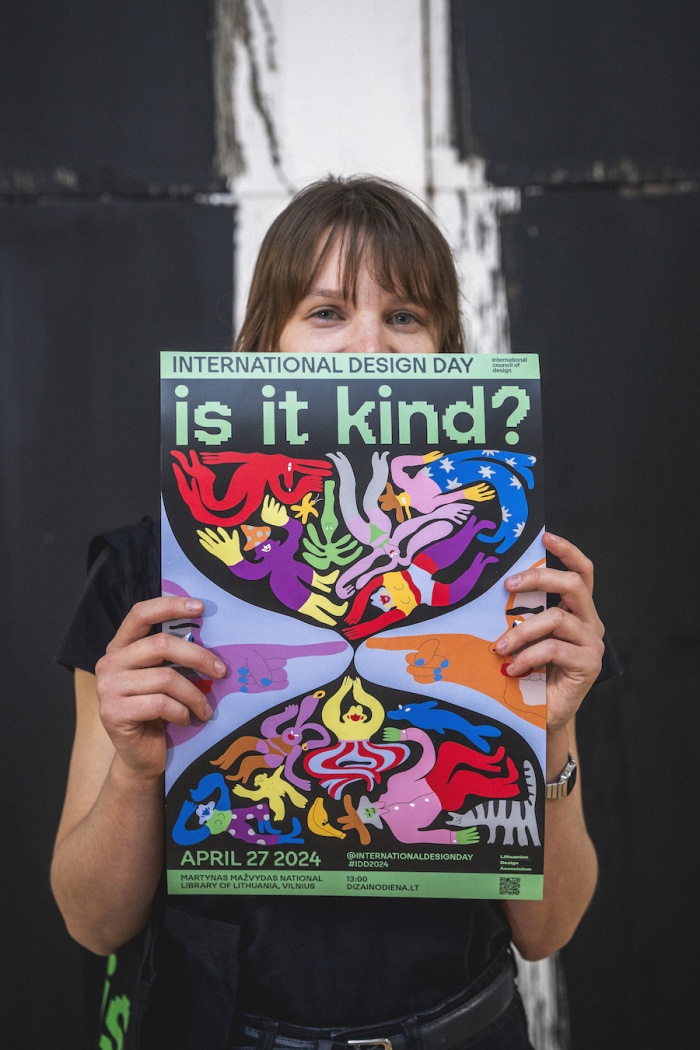
03.06.2024 ICoD news
Is design kind enough? How does kind design address accessibility issues? What participatory and care models help make designing kinder for all? On 27 April 2024 International Design Day we asked designers to think about reshaping design as a kindness practice under the theme is it kind? In this recap we offer highlights from a series of dynamic conferences, talks, workshops and exhibitions hosted by ICoD Members the Lithuanian Design Association (LDA) and INTI International College Subang (Malaysia). Activities for this year were led by ICoD Member Lithuanian Design Association (LDA).
LDA WORKSHOP
International Design Day Lithuania developed by LDA was an in-person workshop and conference in Vilnius, Lithuania. The conference was streamed online on the ICoD YouTube Channel and was accompanied by a workshop in Vilnius. Using a "World Café" approach, in which designers and participants engaged in moderated discussions led by questions about how to understand whether design is kind, and to determine which existing systems and approaches help and hinder the creation of kind design.
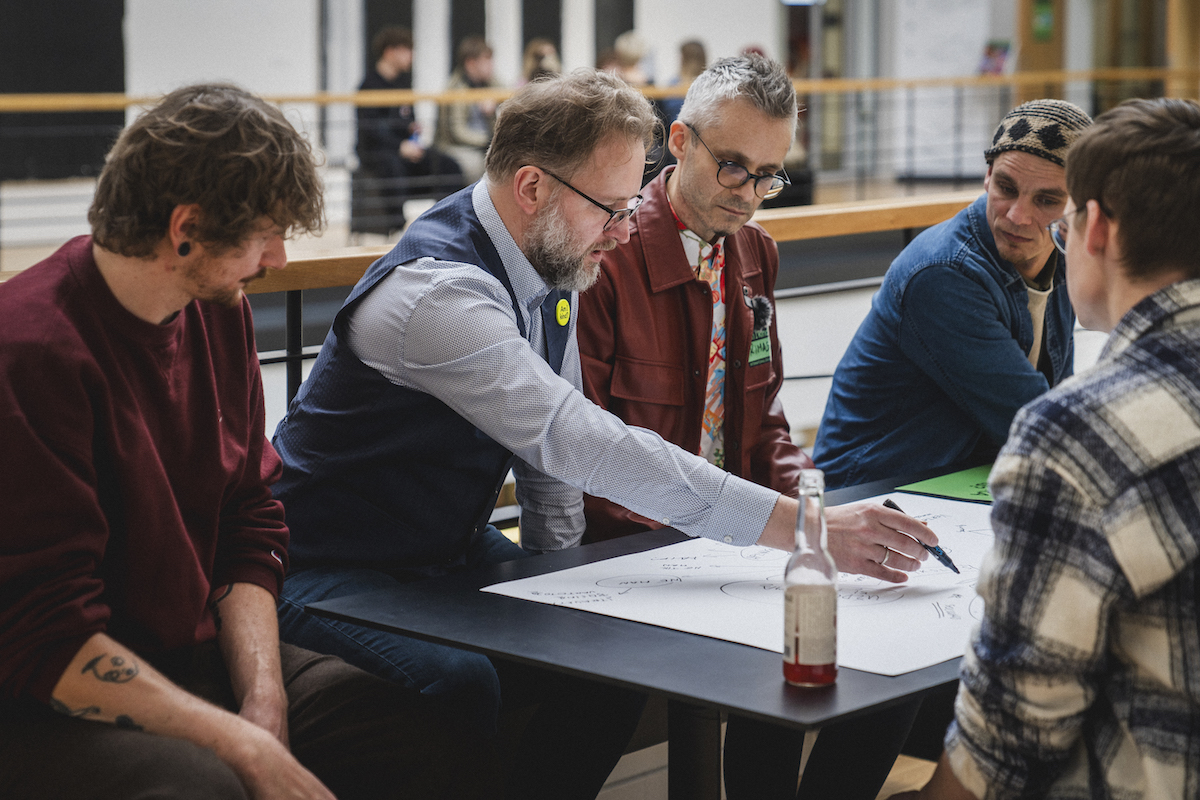
Algirdas Orantas, LDA Chairman and Member representative, leads a discussion as part of the International Design Day Lithuania workshop.
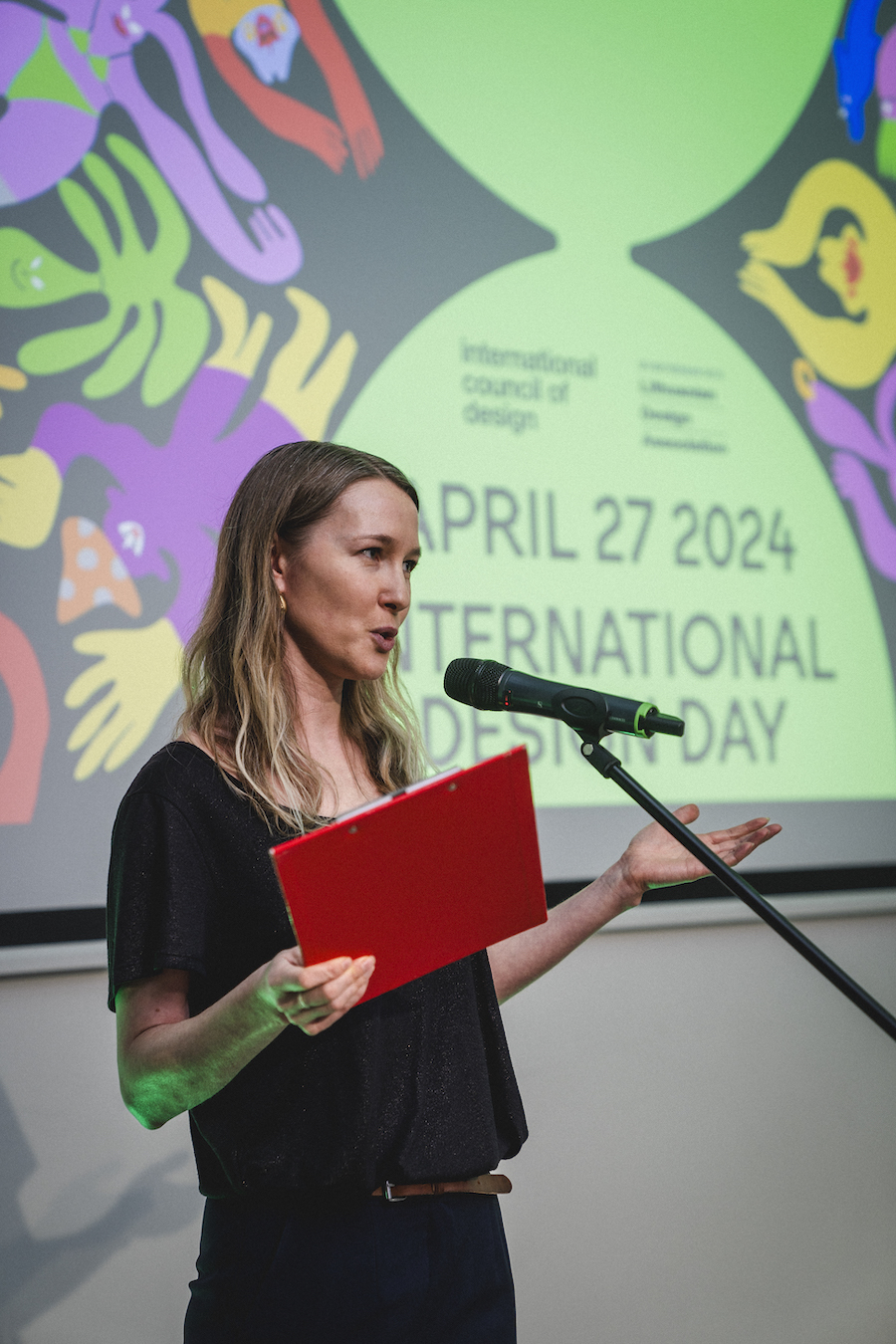
Urtė Karalaitė moderating the is it kind? conference talks setting the stage for the workshops as part of International Lithuanian Design Day 2024.
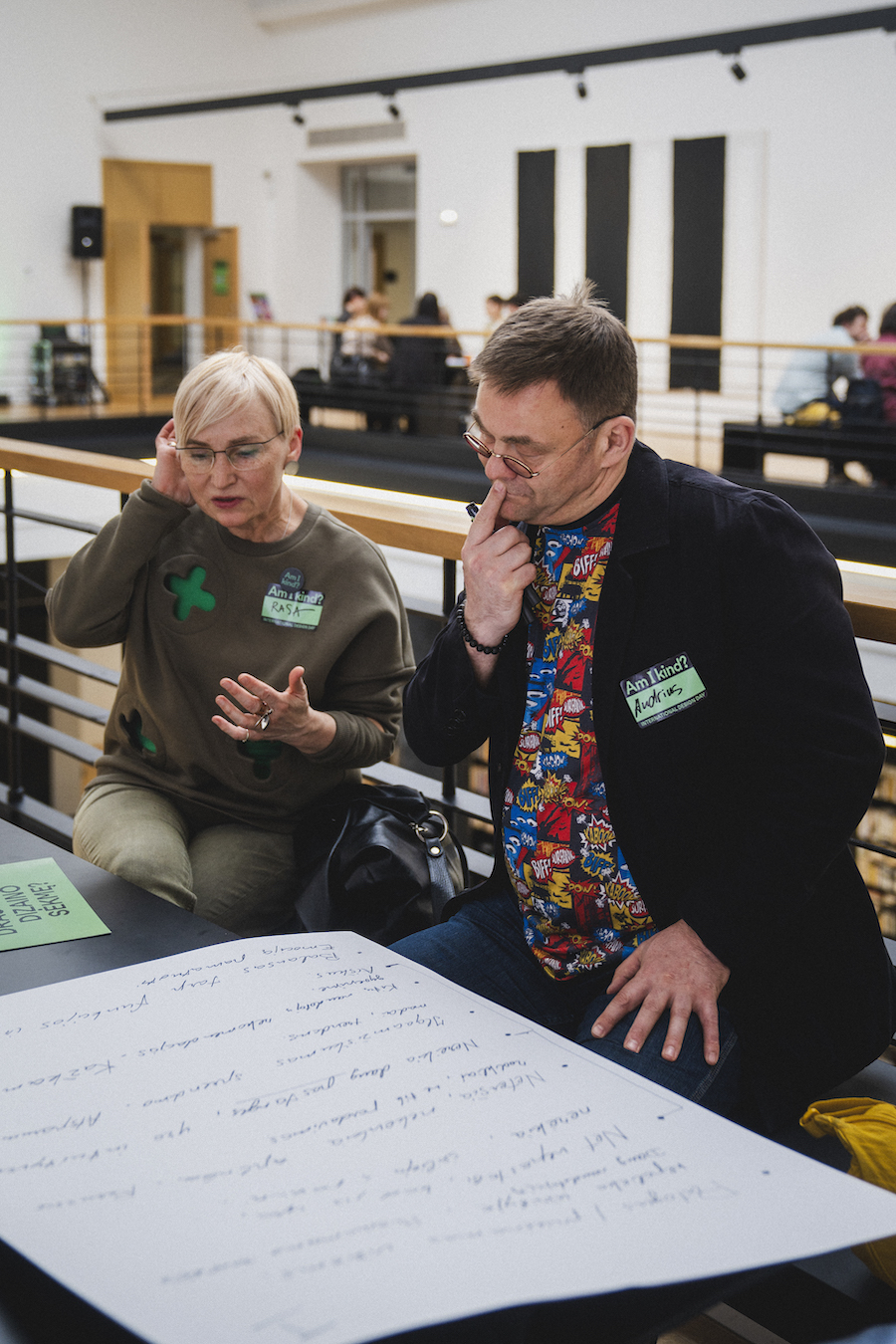
WORKSHOP OUTCOMES
The LDA workshop in Vilnius explored, through discussion and mapping, how to incorporate kindness into design practice in a more meaningful way. Groups talked about how to distinguish between design that only just meets ethical standards and design that embodies kindness, and what kind of metrics could be used to show the ‘success’ of kind design. The discussions were enriched by inviting not only designers, but also members of the wider community, from a wide range of disciplines, to participate in the debate. What follows are some notes and outcomes from the is it kind? workshop group discussions:
How to we understand if a design is kind?
Kindness in design is shown through its ability to consider a wide range of stakeholders, including users, the general public, and the designers themselves. Kind design not only meets ethical standards but is also friendly to all users and resources, contributing to overall well-being. This approach is created from the beginning of the process with consideration of its impact, not only in terms of client profit and goals, but also for the community and the environment.
Which existing systems and approaches help or hinder the creation of kind design?
Systems and approaches that help to include tolerance and integration, as a form of collaboration among different cultures and social groups aids in creating kind design. Surprisingly, competition can motivate creators to strive harder and improve their solutions. Constructive dialogue among users, designers, and manufacturers allows for the creation of designs that meet users' needs.
However, certain existing systems and approaches can also hinder how much kindness is built into the design. Fear of trying new things and taking risks can stifle creativity, while secularisation and overly strict rules or standards sometimes limit creativity and create more obstacles than solutions.
How can kindness be more meaningfully integrated into practices?
Kindness can be integrated into design practices by actively engaging in dialogue with users, collecting their feedback, involving them in the creative process, and testing prototypes. It is important to clearly define the values to be reflected and conveyed, and to ensure that products or services not only meet user needs but are also friendly to the environment and resources.
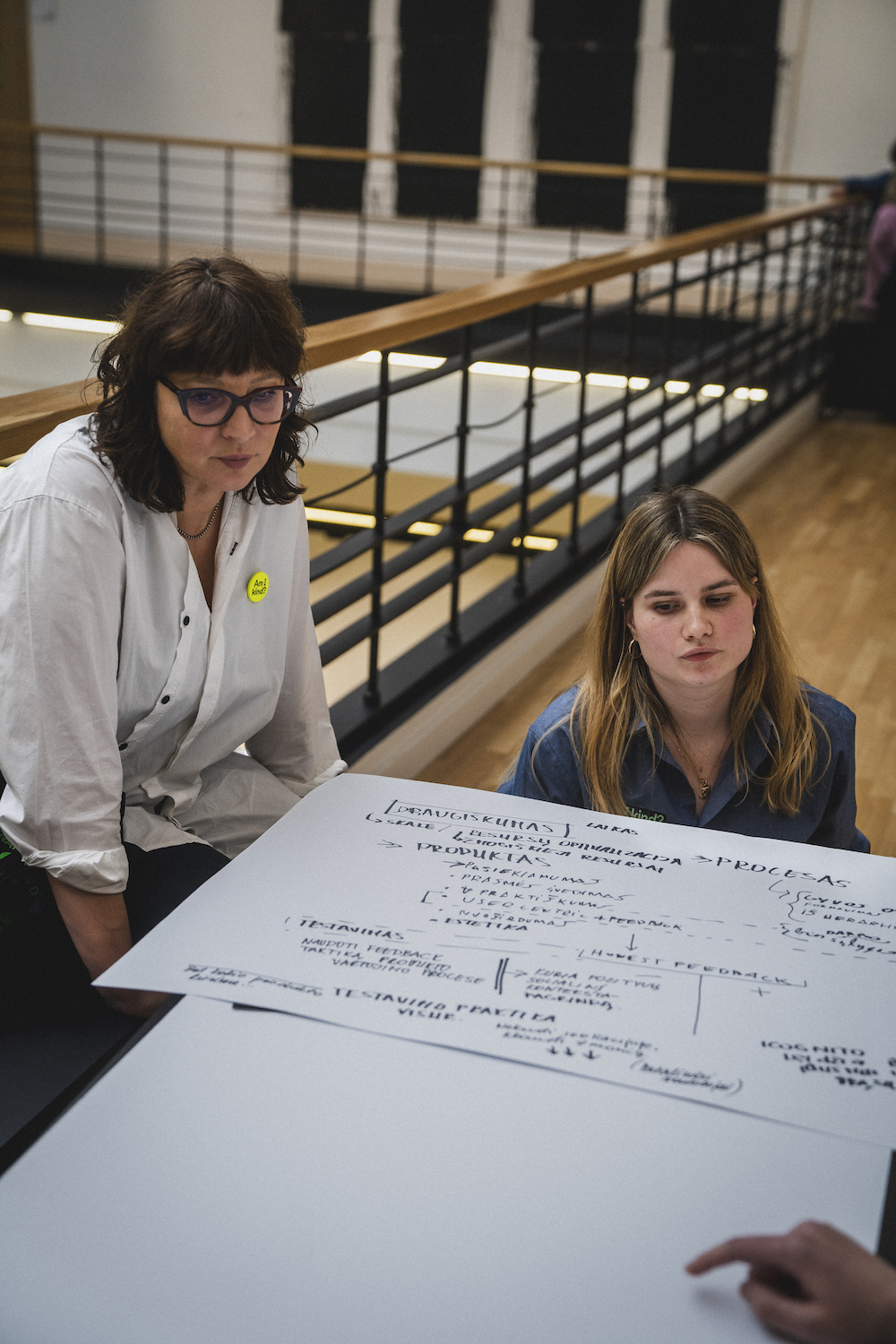
How can one distinguish between design that just meets ethical standards and design that embodies kindness?
Design that just meets ethical standards may be cheaper and more easily accessible but may not consider the broader needs of users or the environment. In contrast, kind design satisfies user needs, does not harm the environment, is intuitive, adaptable to various audiences, and brings joy and satisfaction to users.
What indicators can show the success of kind design?
Success can be shown by evaluating the quality of the user experience: kind design seamlessly integrates into users’ lives and is easy to understand. It is also characterised by sustainability and longevity, resistance to short-term fashion trends, and ease of adaptation. Such design balances function and aesthetics, satisfying both the emotional and practical needs of users. Additionally, investing in the relationship between users and designers provides what we could call “karma points” — benefits that go beyond the immediate present and impact future scenarios.
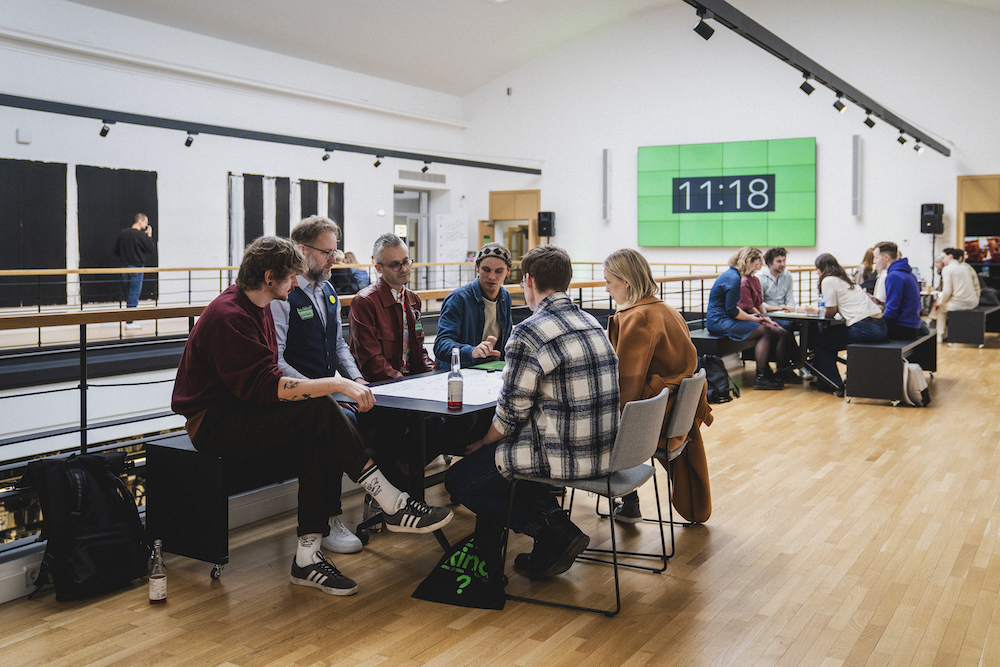
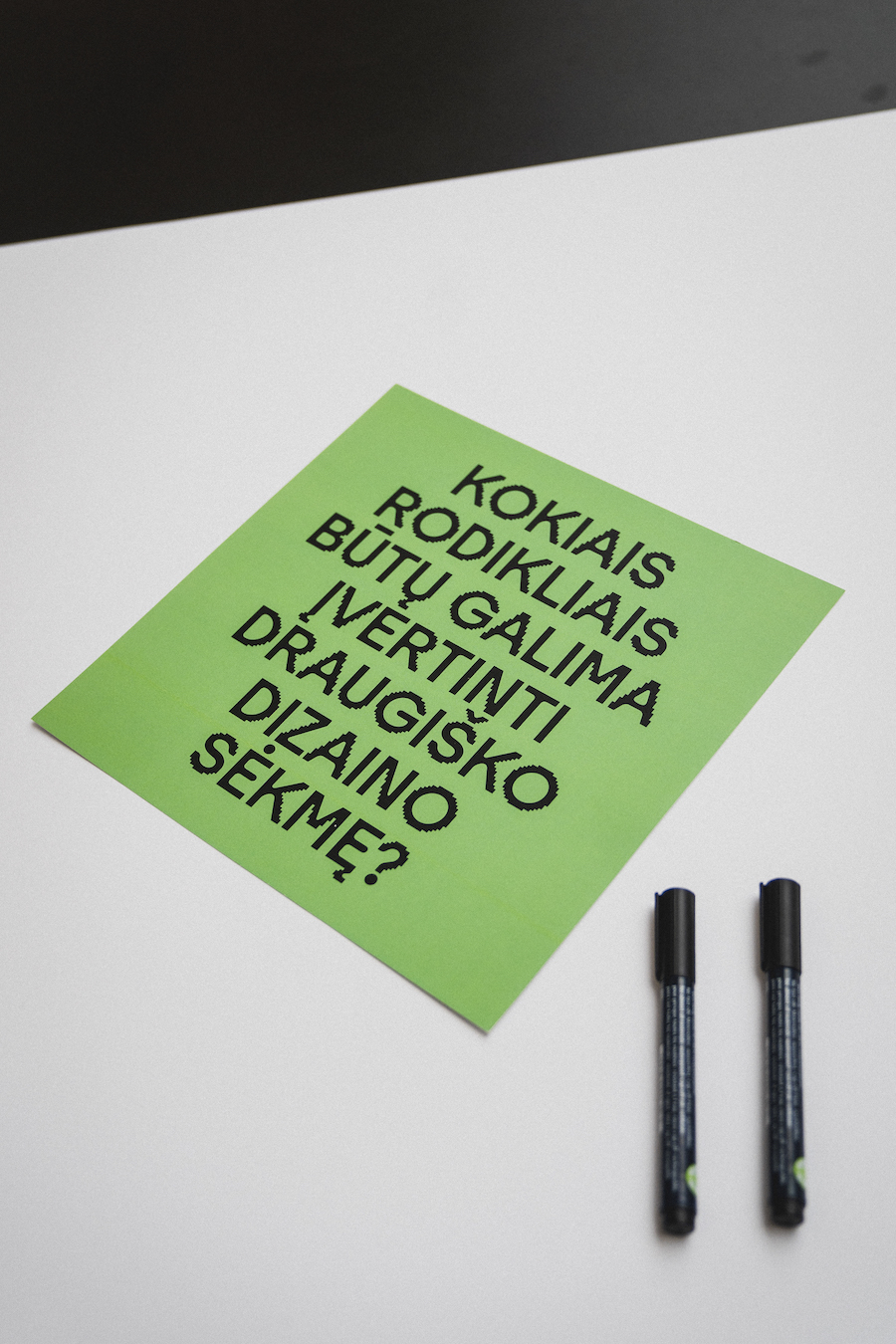
LDA CONFERENCE TALKS
Moderated by boradcast journalist of radio and podcasts Urtė Karalaitė, the conference, a series of talks, was opened by Dominykas Karpovičius, Partner at Research & Design Agency THE CRITICAL, ISM lecturer and unprofessional philosopher, who discussed the theme of the conference and how contemporary design intertwines with kindness and humanity. (You can watch the talks in English here on the ICoD Youtube Channel.)
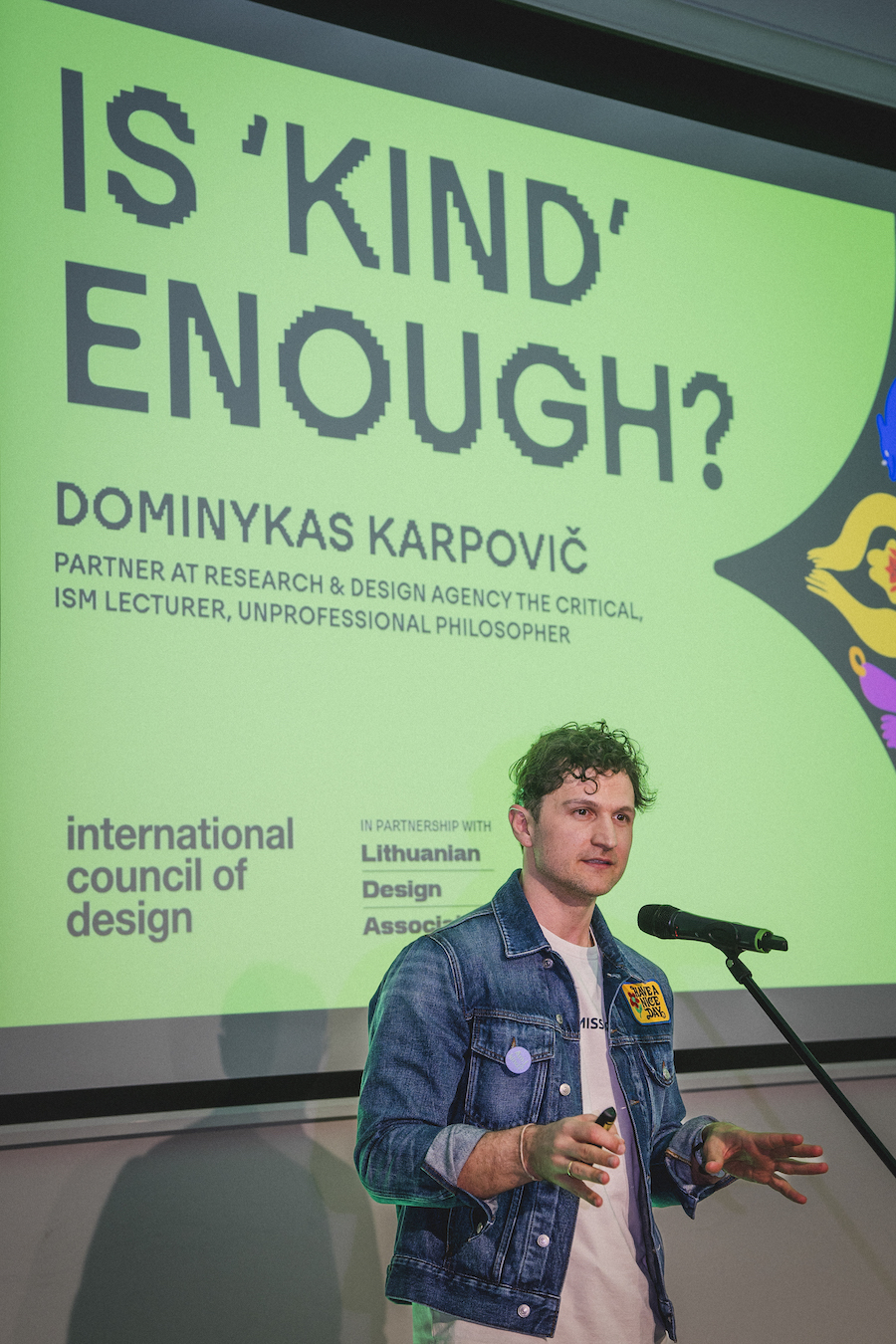
Dominykas Karpovič gave the opening talk, a philosophical query into the question: Is it Kind Enough?
"Design is poetry that aims. Because design opens, guides, reveals, it is never fully visible and not a means in itself. And ... it is beautiful." — Dominykas Karpovič
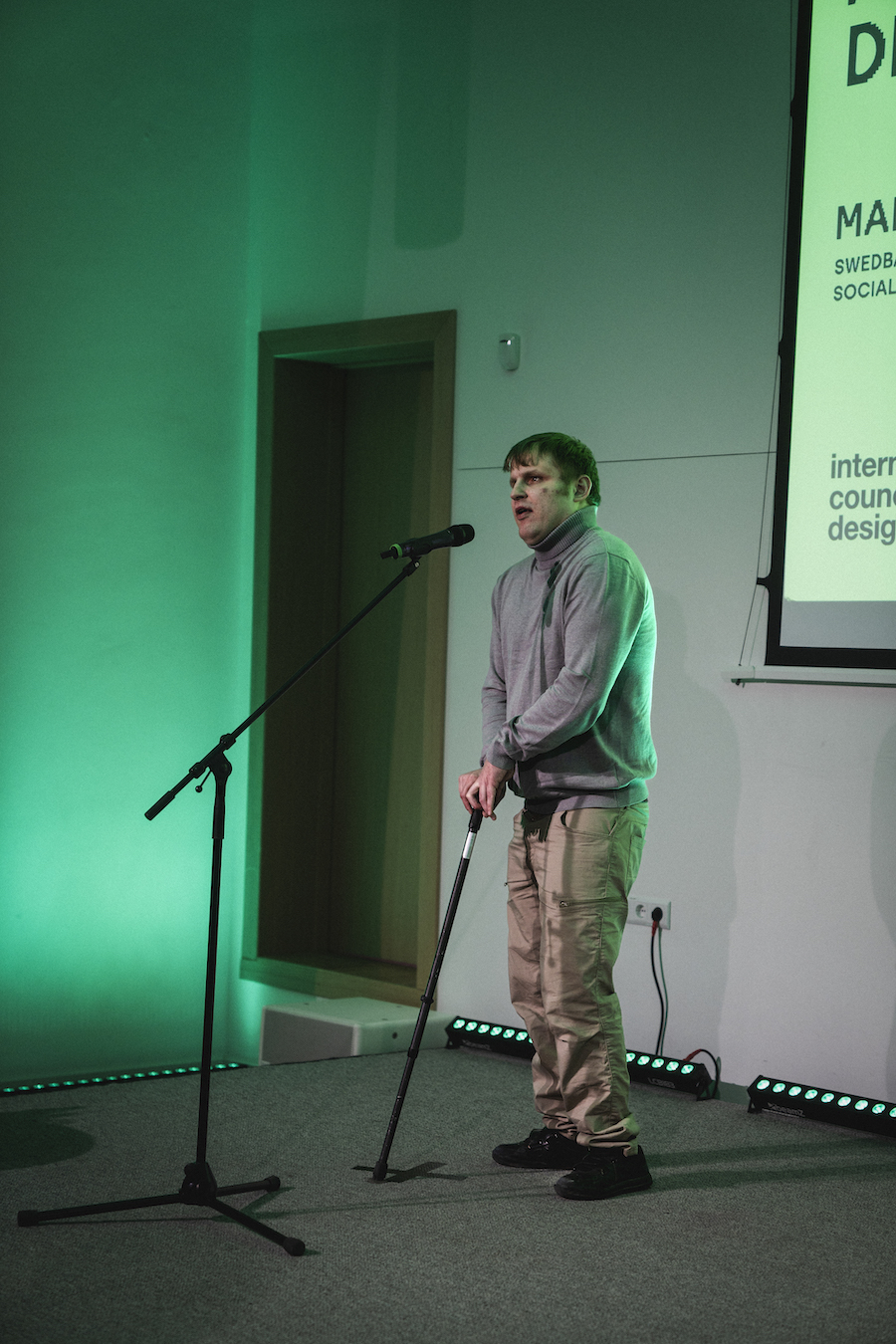
Accessibility Specialist and Social Activist Martynas Vitkus presenting the Interacation between Accessibility and Disability.
Martynas' talk shed insight on the everyday realities of living with a disability, and how technologies need to be designed in collaboration with people with disabilities. Certain AI programmes can describe, in detail, the visual elements of a photograph.Screen readers and navigation apps enable mobility through the city, while games with consoles that integrate screen readers to play games with other users create new accessible modes.
"We are using accessibility tools every second of our lives. If we tell our stories society will become more accessible for all of us and we can live comfortably and independently." — Martynas Vitkus
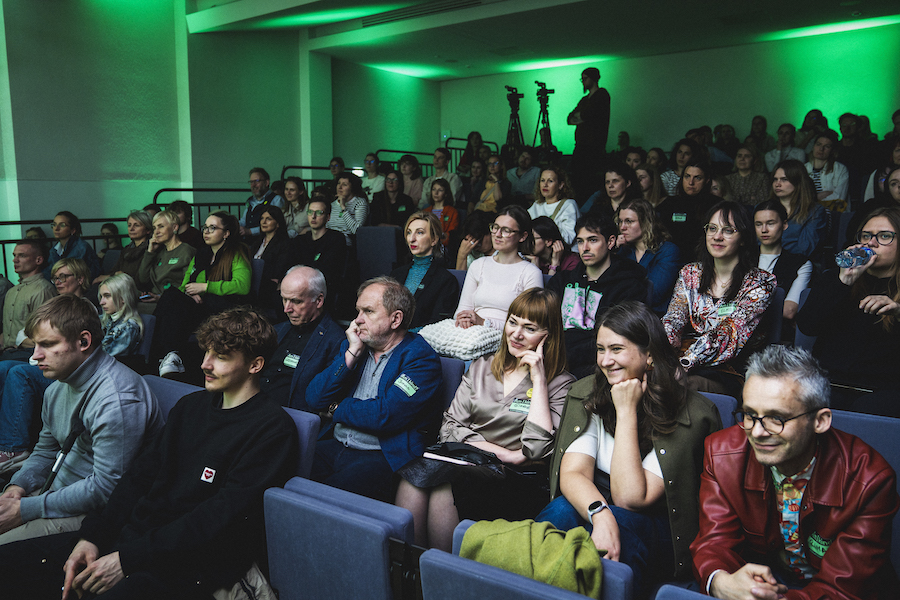
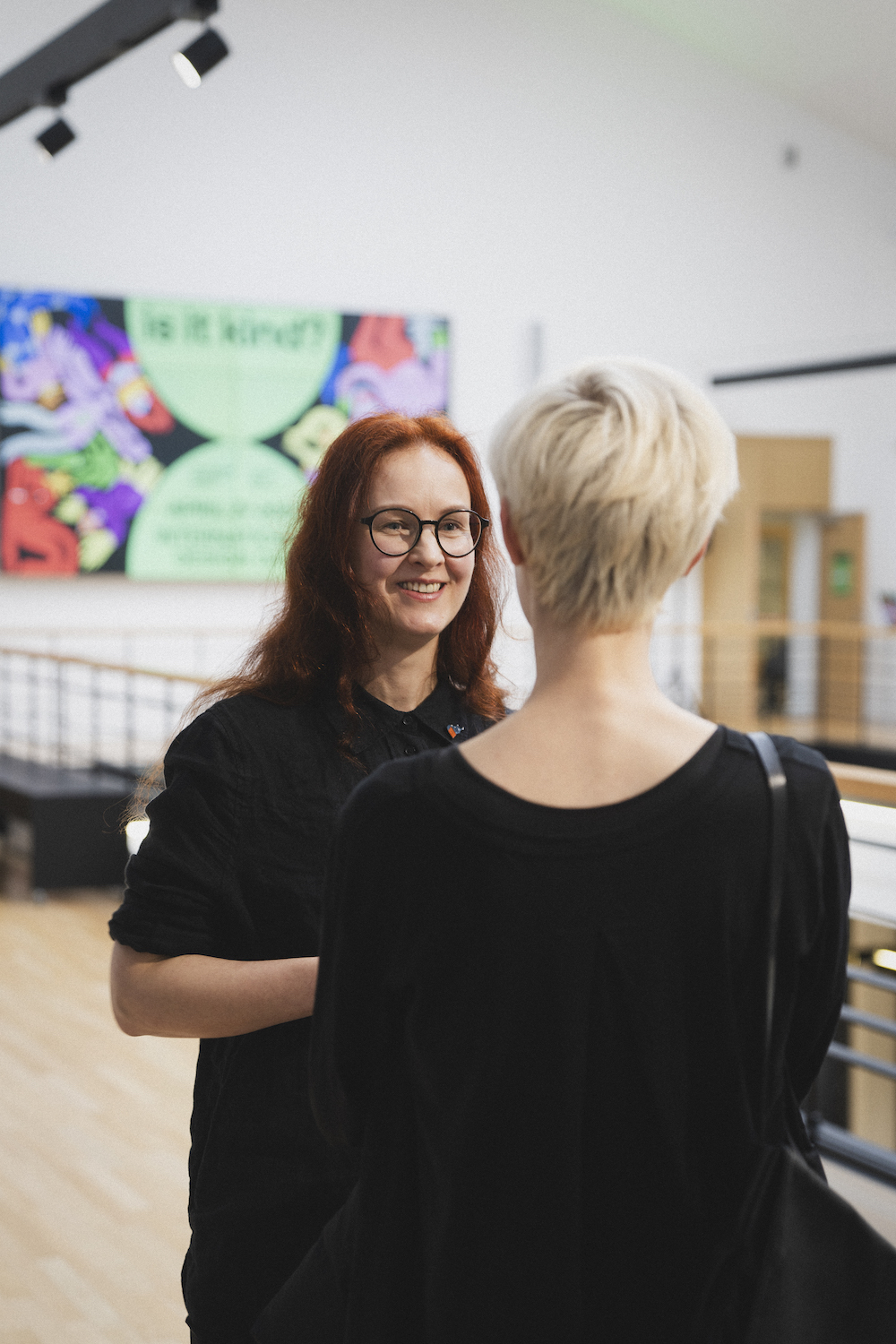
Dr. Dalia Čiupailaitė-Višnevska engaged with questions about how the social sciences intersect with design.
Speaker Dr Dalia Čiupailaitė-Višnevska, researcher and lecturer at the Department of Sociology at Vilnius University, presented ways in which social research can be applied to the design process. Dalia developed a seed theory that allows specific environments such as libraries, what she calls "connector spaces for communities", to grow based on an approach that centers a child's perspective. By interviewing and observing children at play, she discussed ways designers can engage how children like to tinker, roam and explore barefoot and how they crave not only movement, but friendship; how they like not only beauty, but informal places for gathering.
"Can we just replicate good practices, the same as Instagram pictures? No. We need to allow the specificity of environments to grow." — Dr. Dalia Čiupailaitė-Višnevska
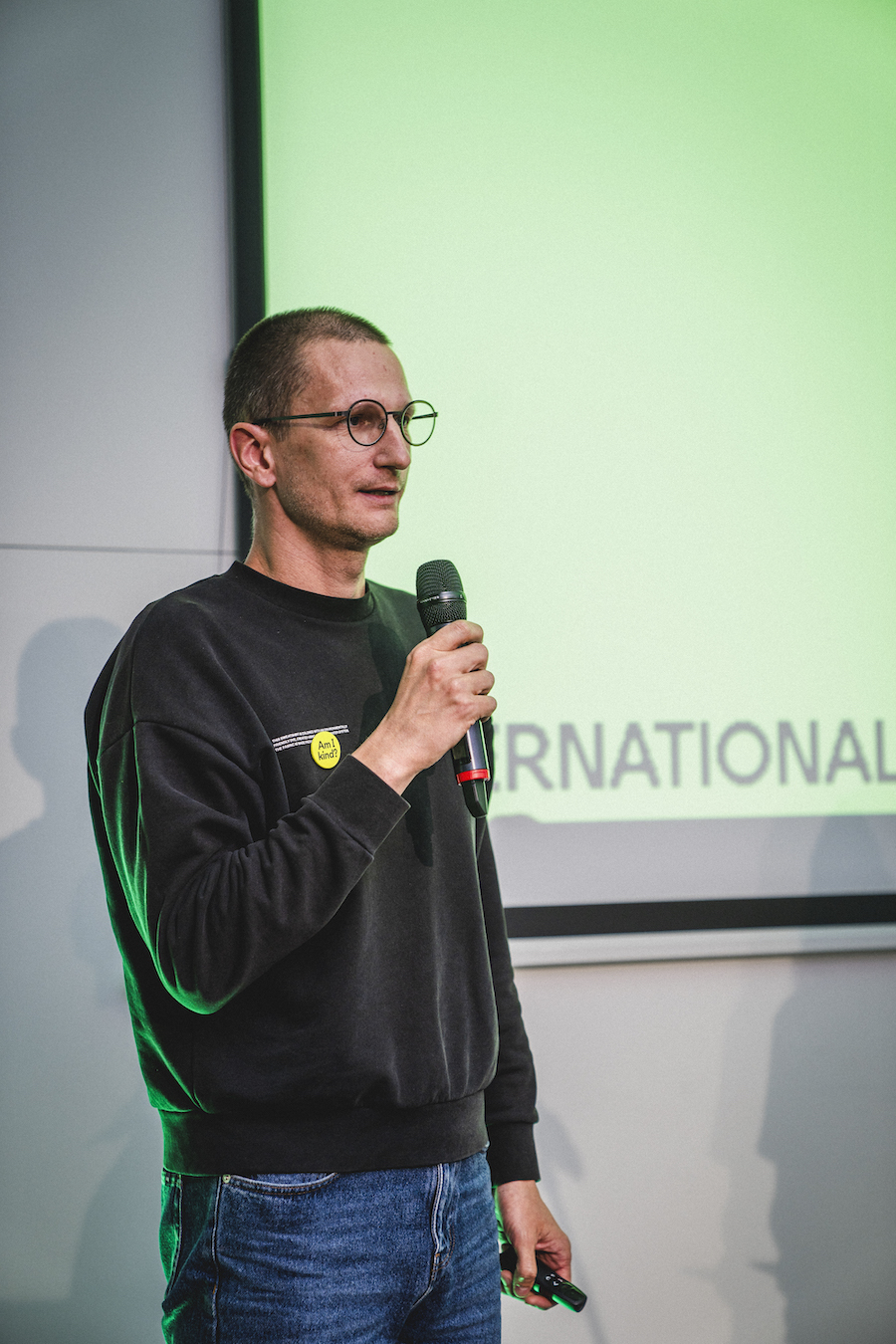
ICoD Secretary General Jonas Liugaila was a key event organiser and also led the proceedings.
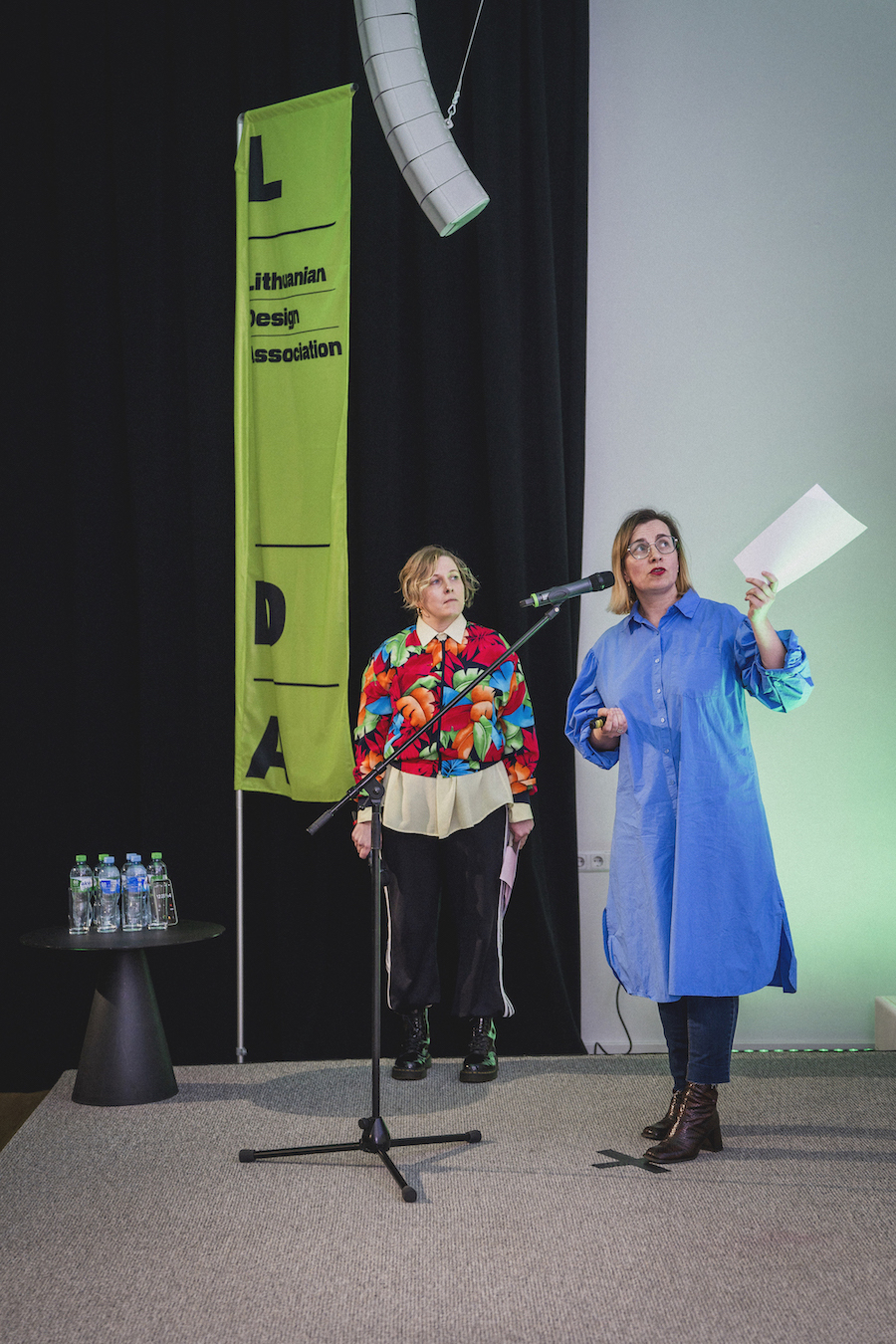 Dovilė Gaižauskienė & Saulė Norkutė
Dovilė Gaižauskienė & Saulė Norkutė
Dovilė Gaižauskienė, Participatory design expert & co-founder of the Performative Design Association & Saulė Norkutė, Member of the Performative Design Association highlighted three aspects stemming from their work as performative design practitioners - sensitivity to context, the ways of creation, community, and dialogue. Through case studies they told a story of how these aspects emerge and intertwine in different stages of working with various communities in their problem site. Using role play, the design team has developed a method to explore different users, problems and situations.
"No to stereotypes! If you play a role that is different from your usual identity, you can experience really different situations, sometimes gaining better understanding of your own family members. Building kinship and friendship into your designing is a process of reflection and role play, and that is kind." — Dovilė Gaižauskienė & Saulė Norkutė
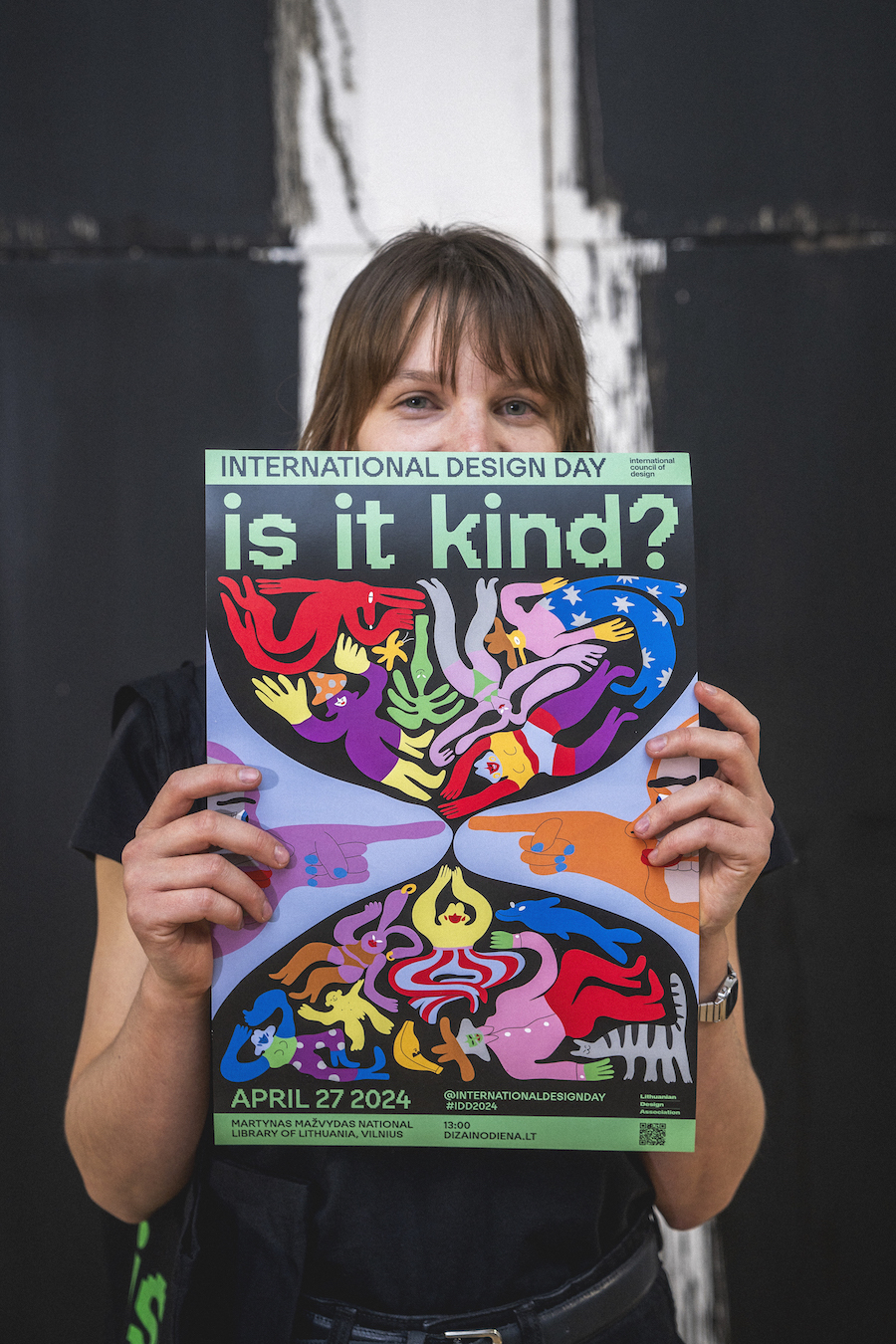
Egle Zvirblyte produced this year's visual identity for International Design Day with the producers Taktika Studio, a design practice by duo Nerijus Keblys and Mantas Rimkus.
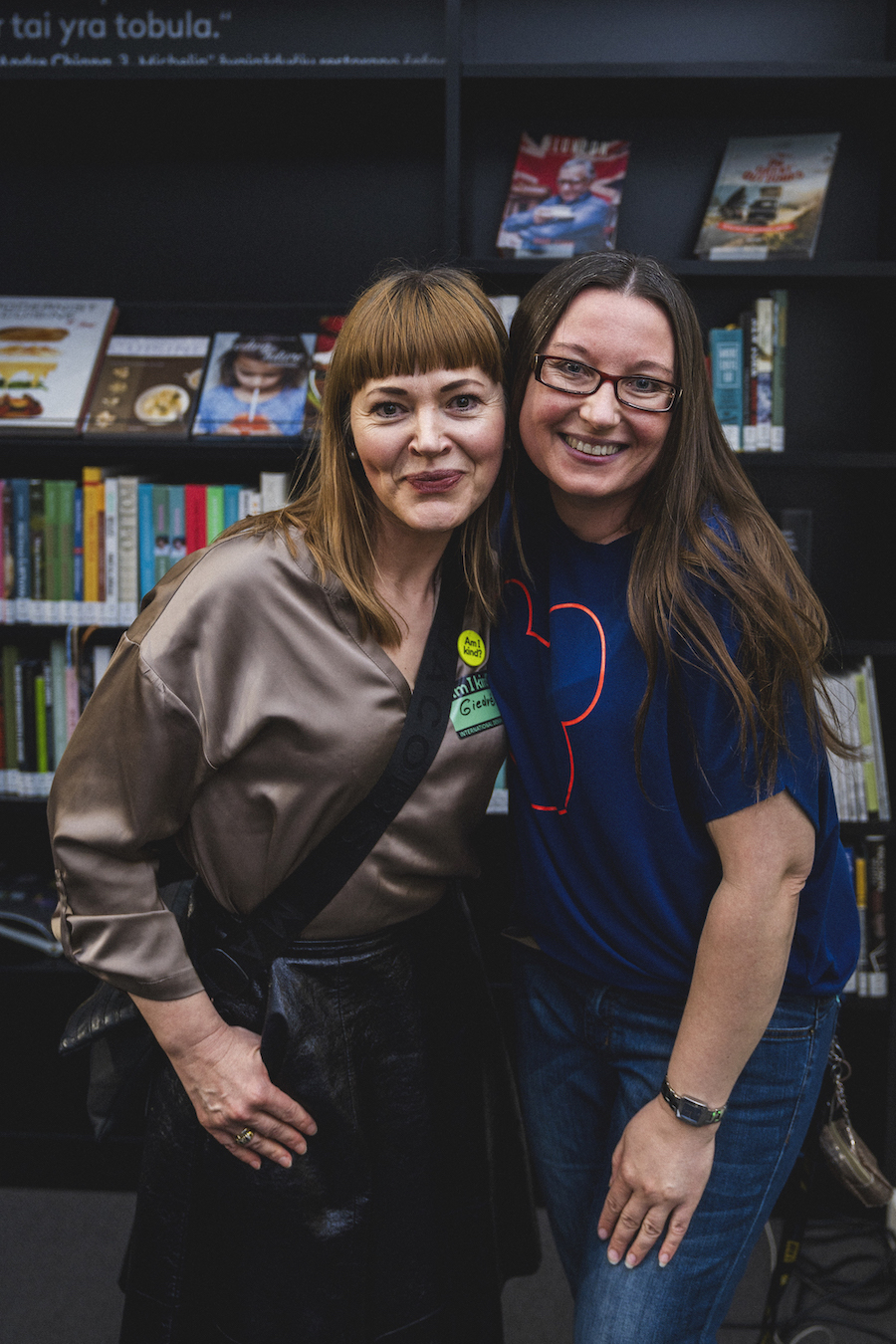
ICAD DESIGN DAYS BY INTI CENTER OF ART AND DESIGN
ICAD Design Days 2024: Is it Kind? worked closely with ICoD’s International Design Day themes. The events united various design disciplines, and celebrating industry diversity to raise awareness around the world's increasing interconnectedness and its impact on our well-being. “Bringing Kindness” was a central interpretation of the theme and fueled a Speaker Series, featuring talks by keynote speakers Asri Ahmad CiDe, Industrial Designer, Creative Consultant and Director of Rifaie Chua & Sethi Sdn Bhd, Will Sii, Illustrator, and Founder of We Post, We Care! and Razak Aziz, Chief Seeder, and Founder of SEEDS Malaysia.
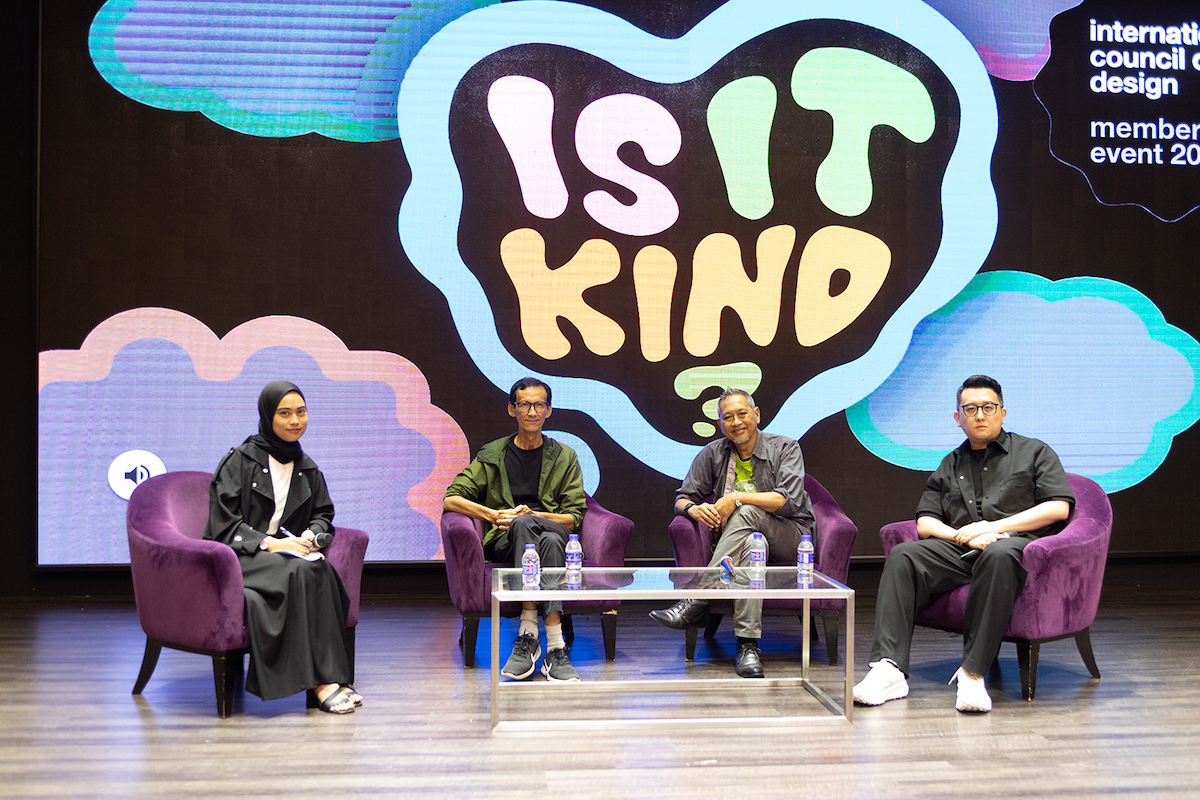
ICAD Design Days 2024: Is it Kind? Speaker Series forum. (Photo credit to Chen Ye Kai)
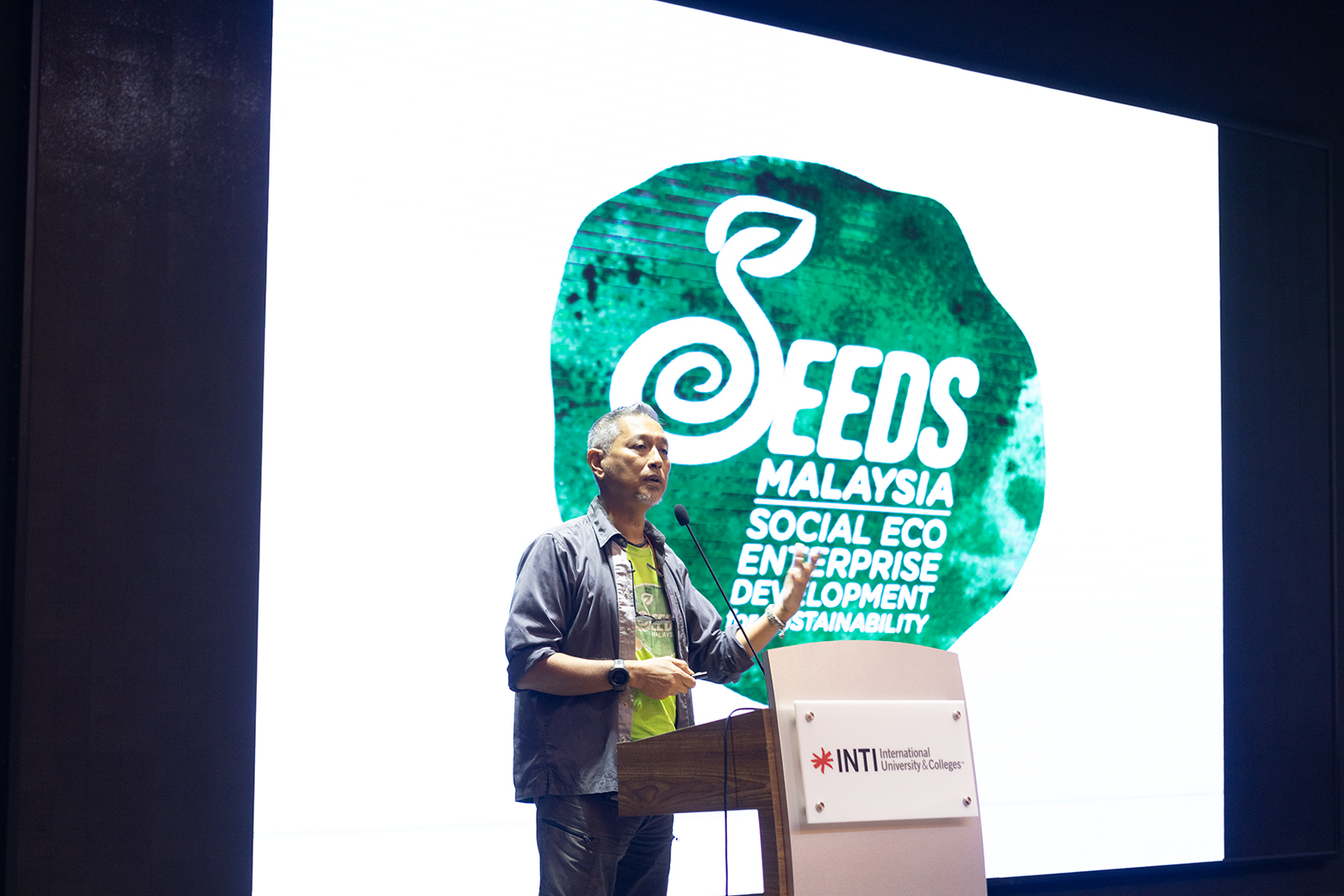
Razak Aziz, Chief Seeder, and Founder of SEEDS Malaysia works with his wife Intan Jailani, a sustainbility initiative that works to empower individuals and organisations to expand community food forests through seed saving, planting trees and committing to "greening" Malaysia. (Photo credit to Chen Ye Kai)
The “Reaching Kindness” Art Bazaar was inspired by the legal model of Duty of Care: a legal obligation requiring individuals to adhere to a standard of reasonable care to avoid careless acts that cause harm (whether visible now, in the present, or future, as a material inheritance). Organised by local artists Wecare and Bezpop, this art bazaar aimed to support kindness with the Budimas Charitable Foundation, an NGO whose mission is dedicated to helping orphaned and underprivileged children to have normal childhoods. And the “Framing Kindness” Exhibition Centering Humanity through Art & Design compiled onto pieces of sustainable fabric into a mixed-media art installation, a collection of expressions and thoughts of kindness from the ICAD community.
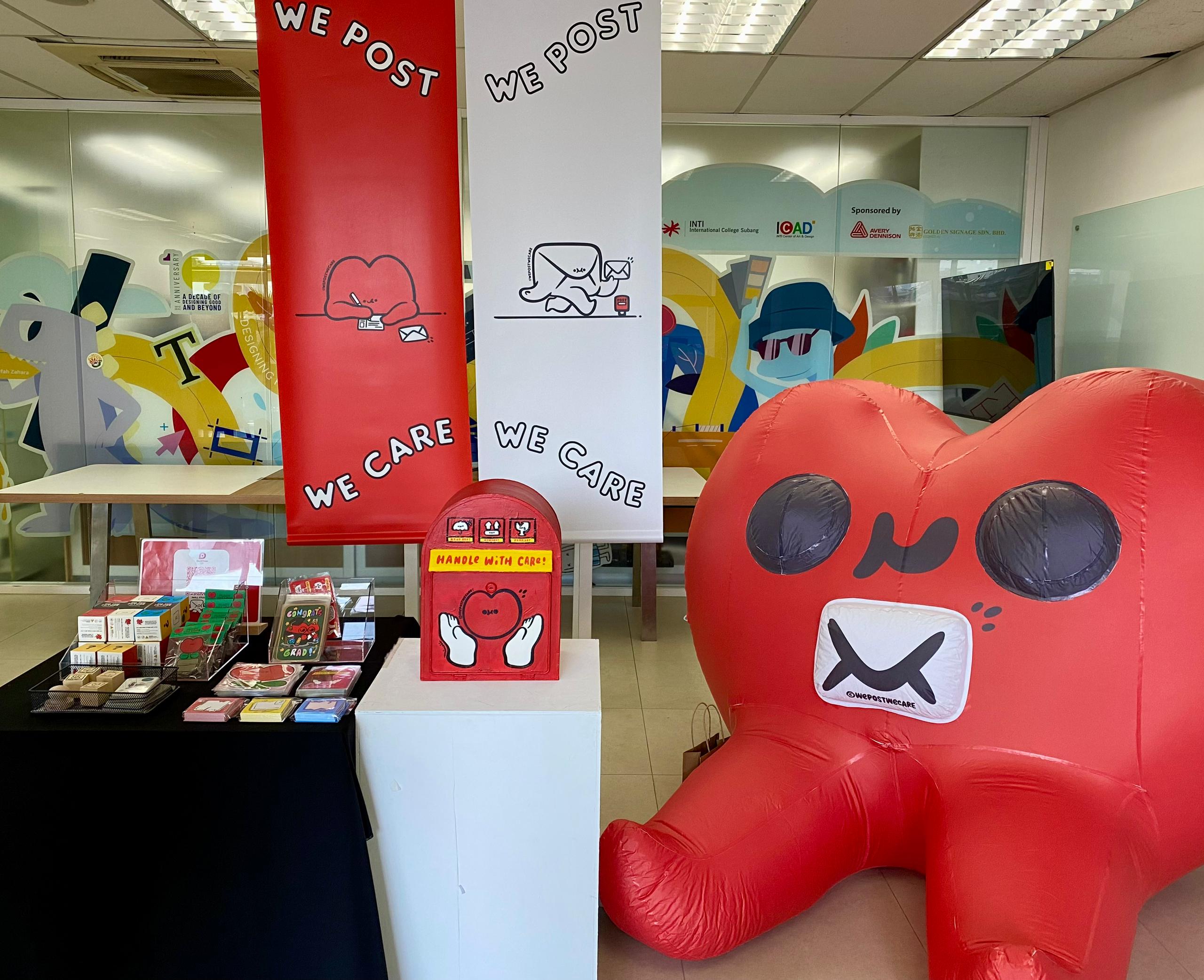
Pop-Up assets created by artist Will Sii, Illustrator, and Founder of We Post, We Care! (Photo credit to William Sii)
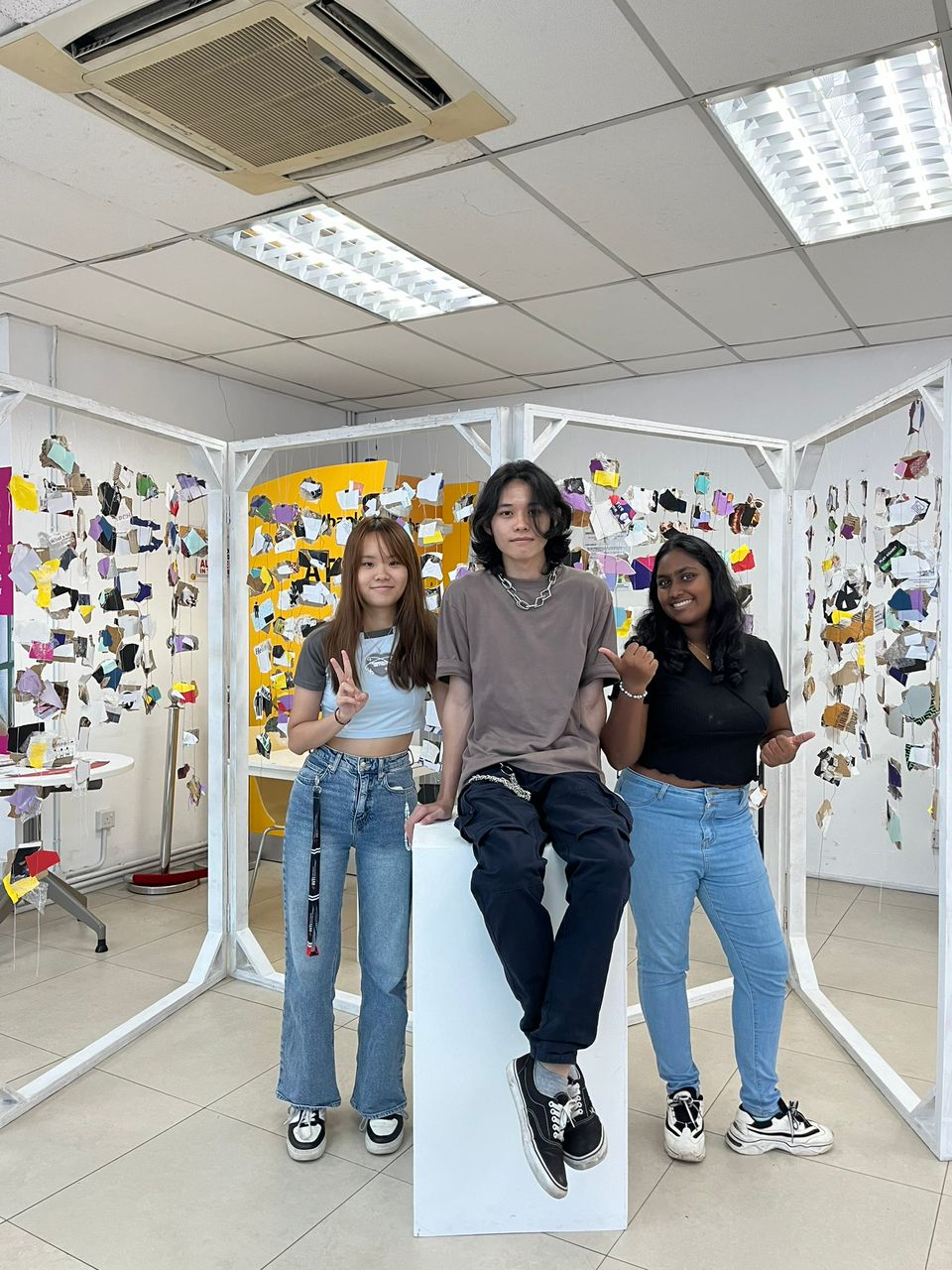
The “Reaching Kindness” Art Bazaar. (Photo credit to Goh Suet Lin)
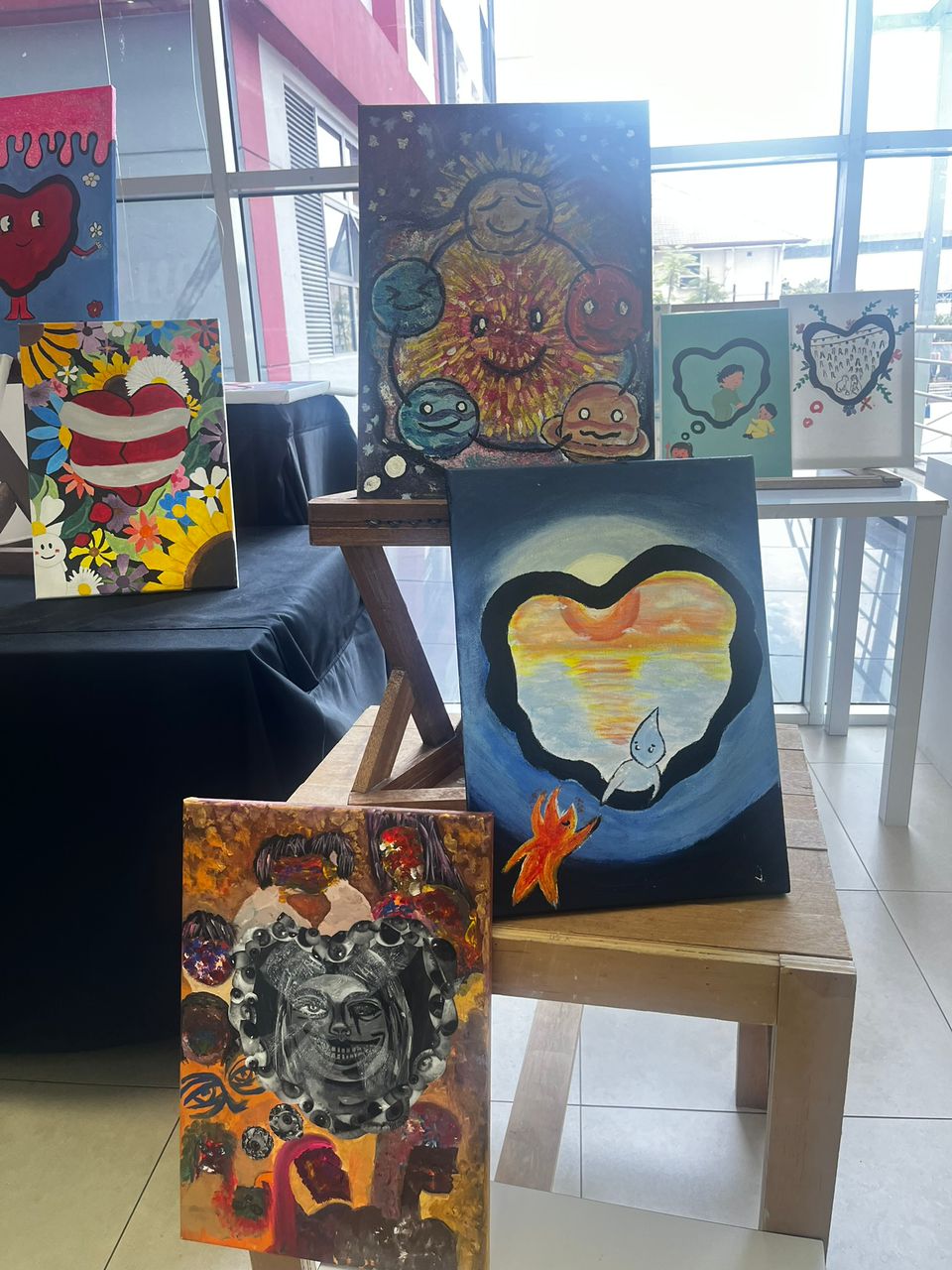
The “Reaching Kindness” Art Bazaar. (Photo credit to Ally Cher)
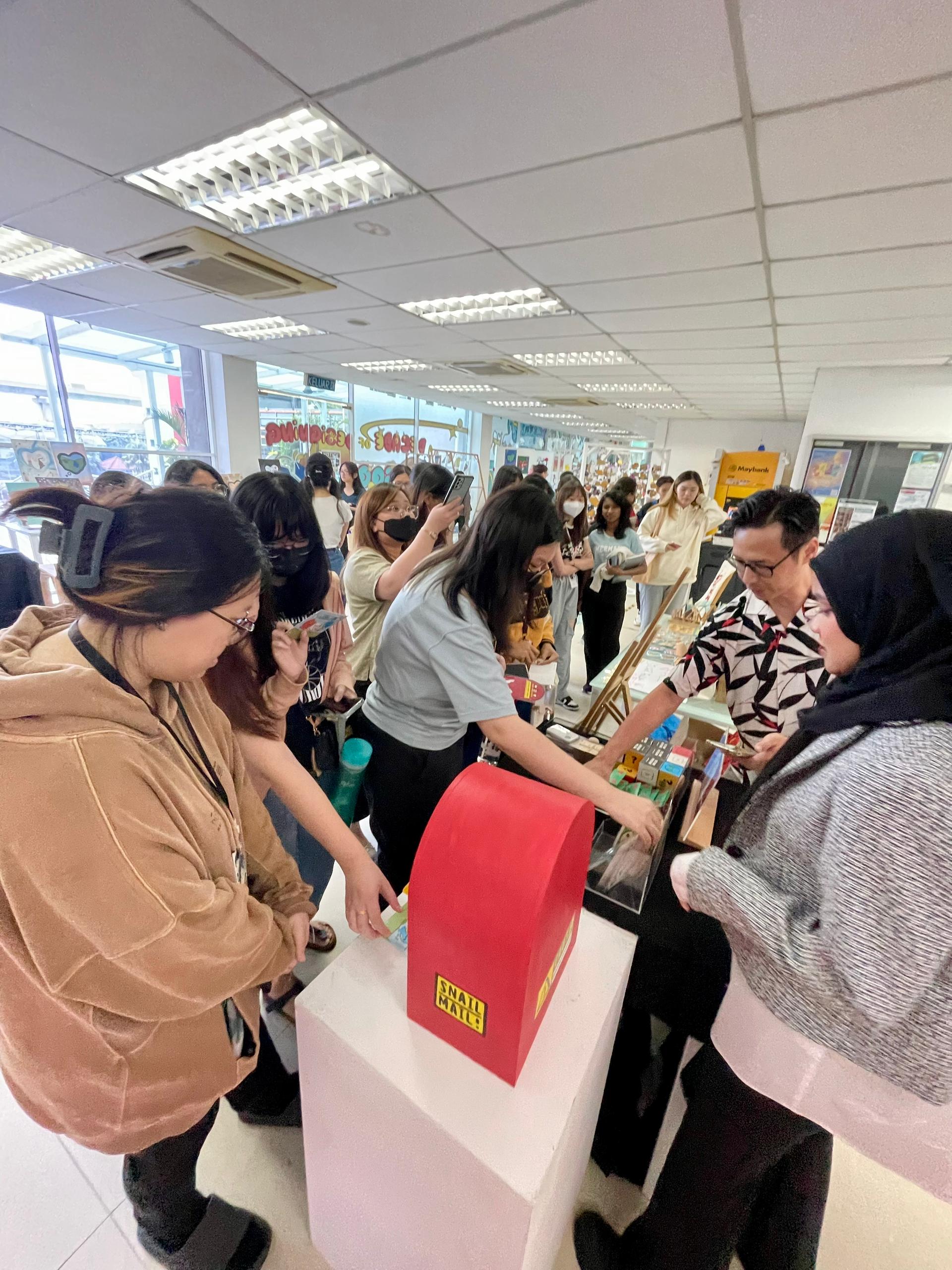
Inspired by the legal model of Duty of Care, the “Reaching Kindness” Art Bazaar brought the design community together combining intellectually engaged, creative activities. (Photo credit to William Sii)
Thank you to all our contributors this year. Stay tuned to for an announcement of next year's theme soon!
ABOUT OUR MEMBERS
The Lithuanian Design Association (LDA) is an independent non-profit organisation formed by the cooperation of professional design creators. Founded in 1996, LDA advocates for the prestige of the designers' profession, stands for designers' interests in government institutions, promotes designers' creative activities, and coordinates the work of various organisations participating in the design process. INTI has established the INTI Center of Art and Design (ICAD) (2013) at INTI Subang campus that offers the full array of art and design programs along with the specialized facilities. Other than the physical facilities, ICAD has emphasized on regular curriculum revamping, where feedback from different stakeholders been collected to create the most robust and industry relevant curriculum. Staff professional development is an on-going faculty initiatives to develop staff knowledge, skills and abilities in inspiring students through teaching. Through this initiatives, staff and students are exposed to practical and interdisciplinary experience maintaining a competitive edge.

relatedarticles
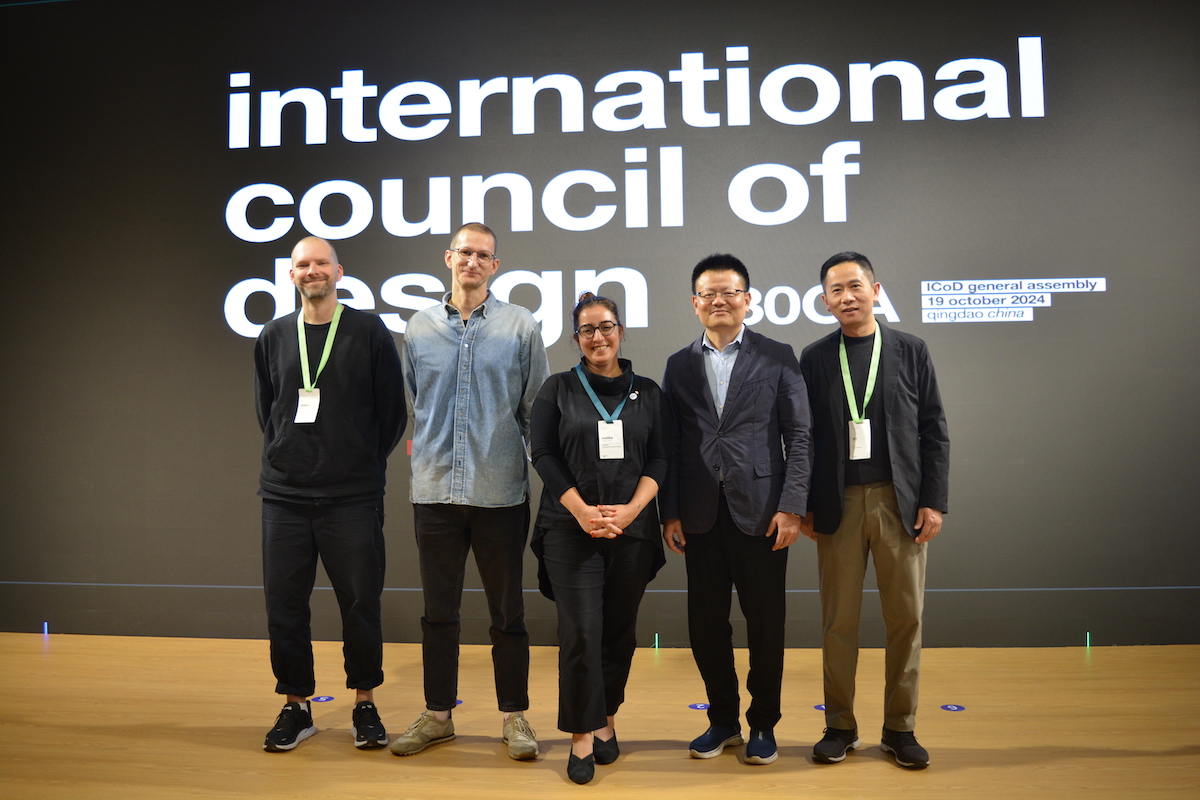
meet the 2024–2026 executive board
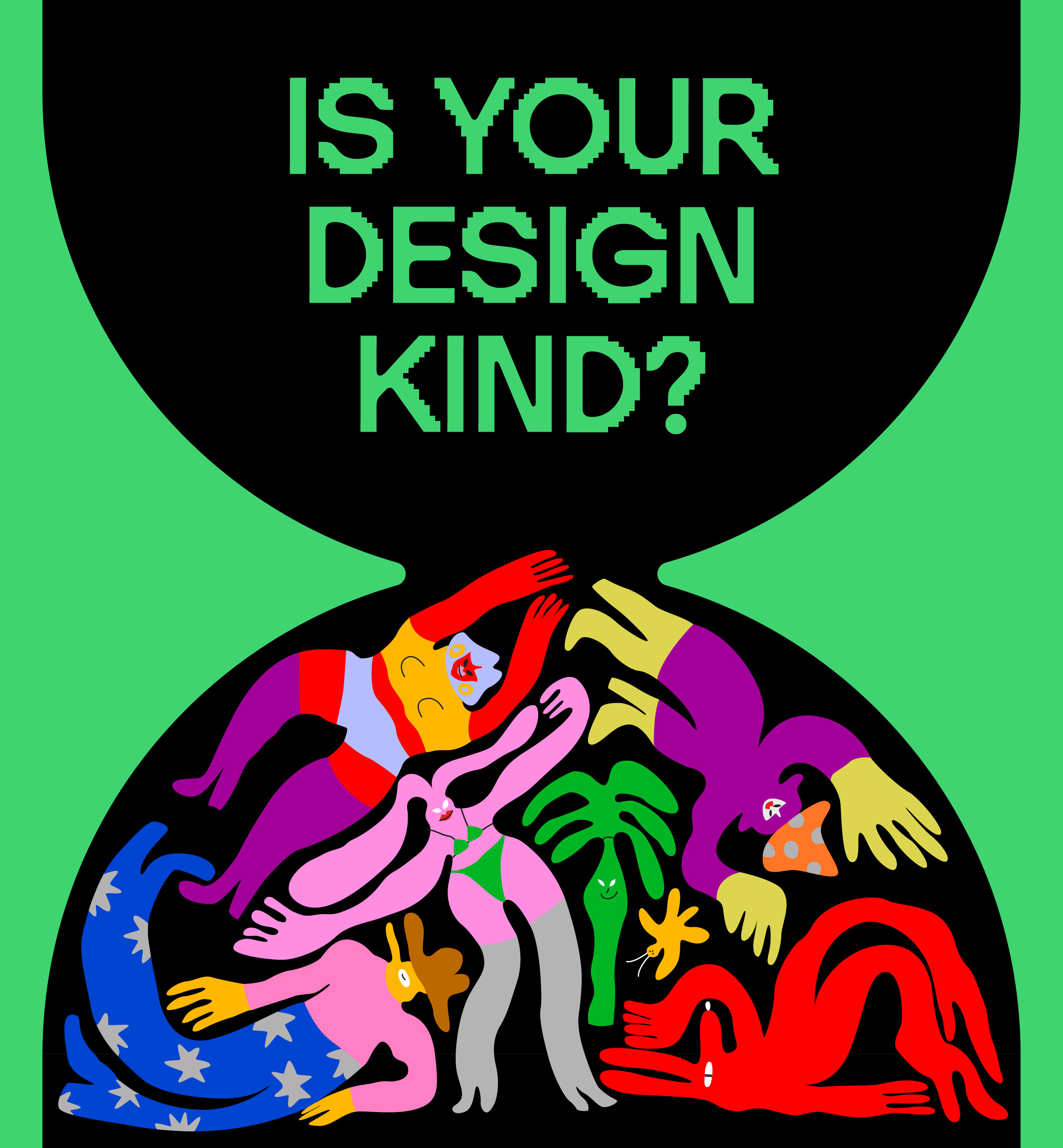
LDA forum + international design day 2024 conference
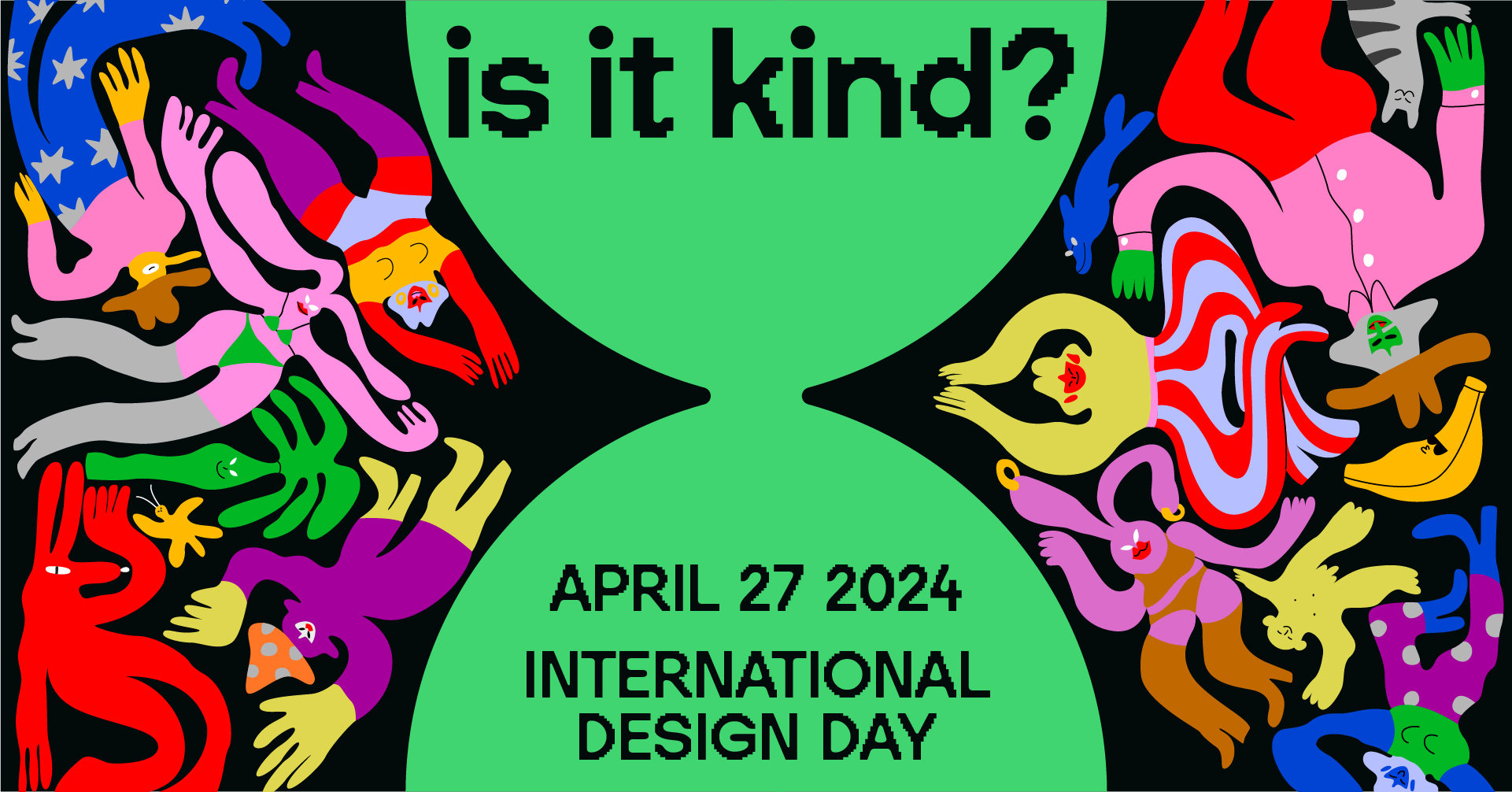
is it kind? ICoD announces international design day 2024 theme
